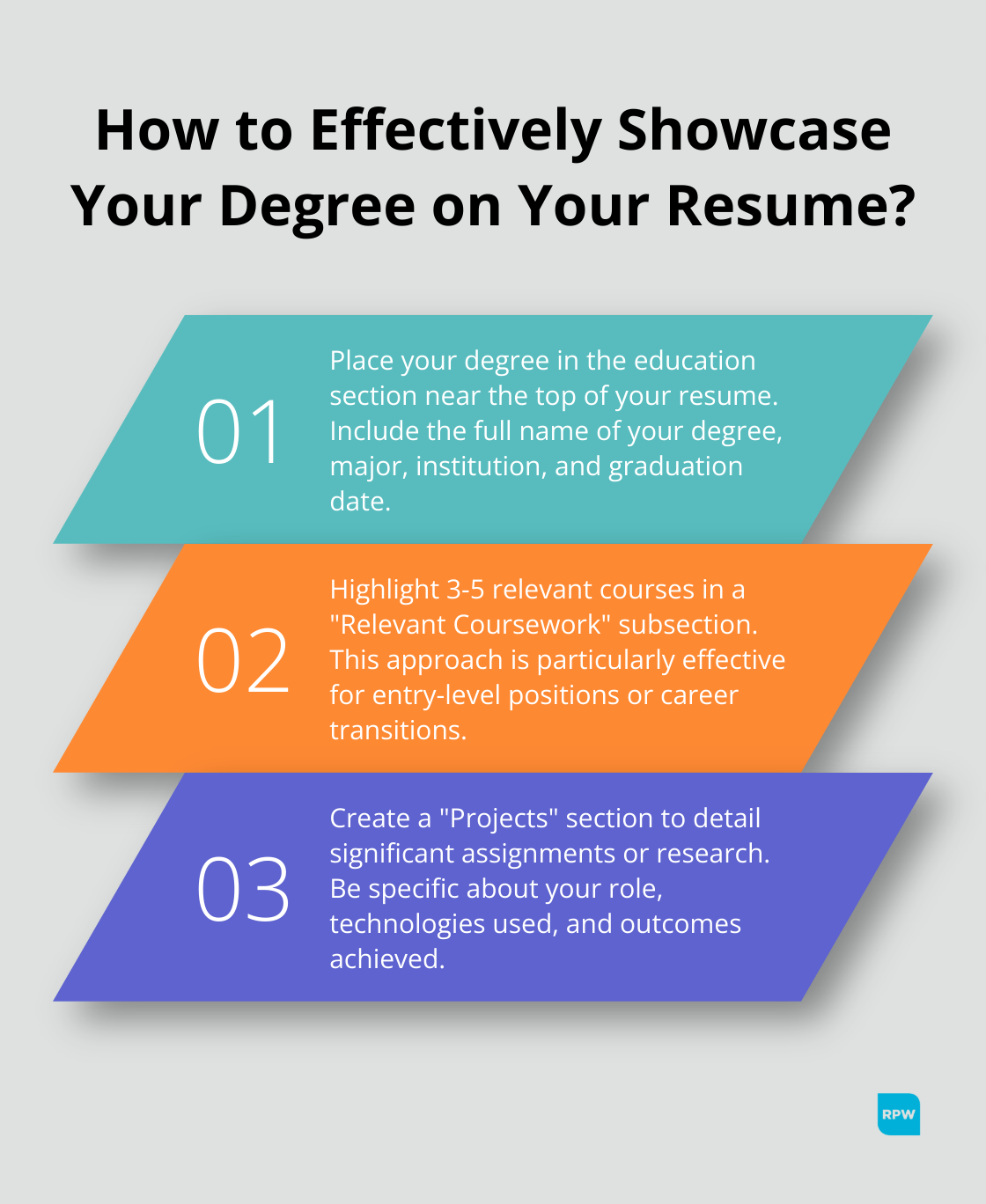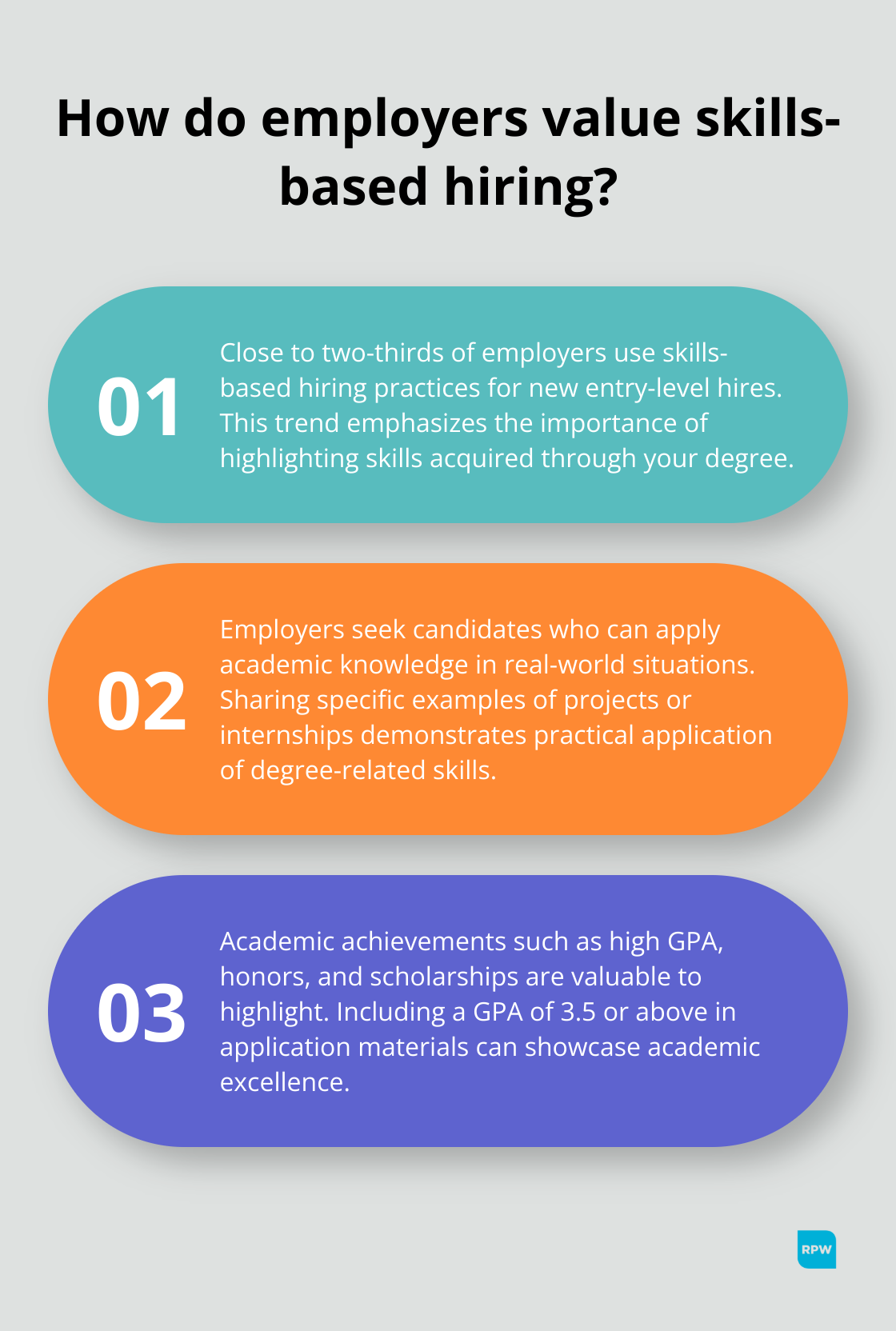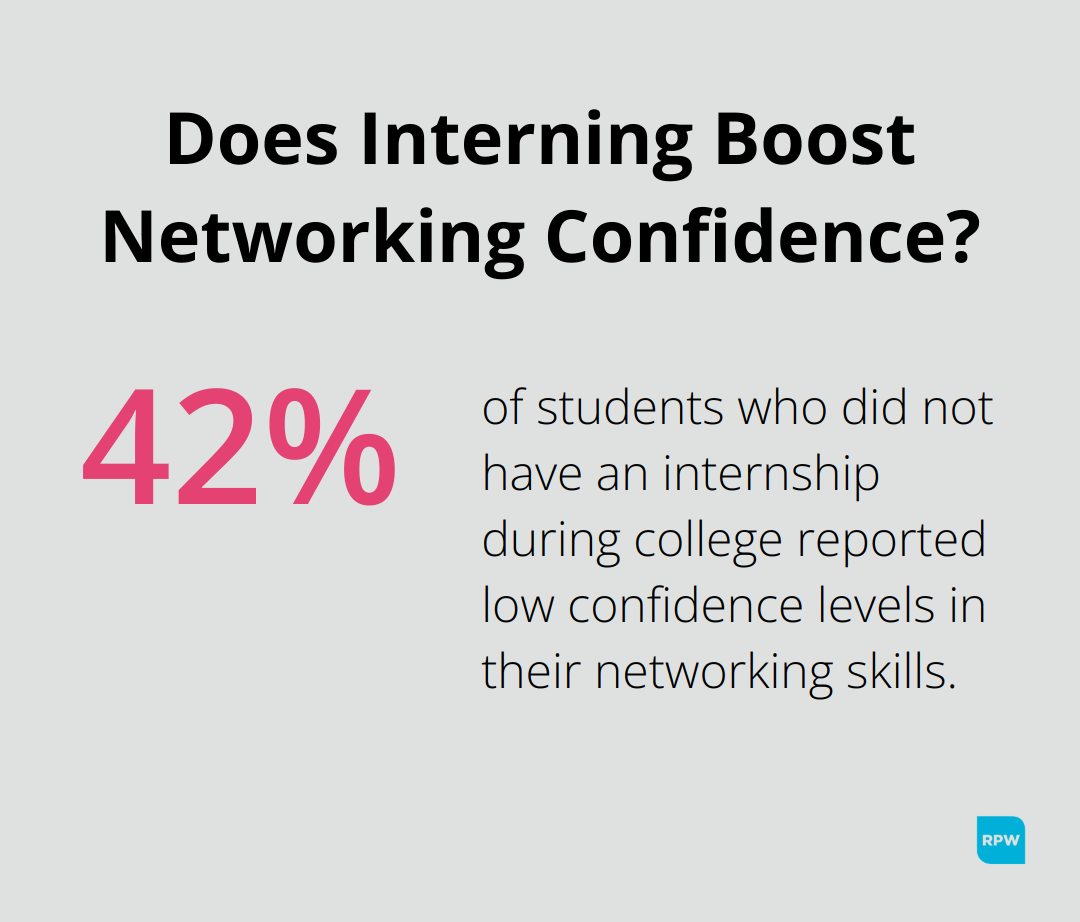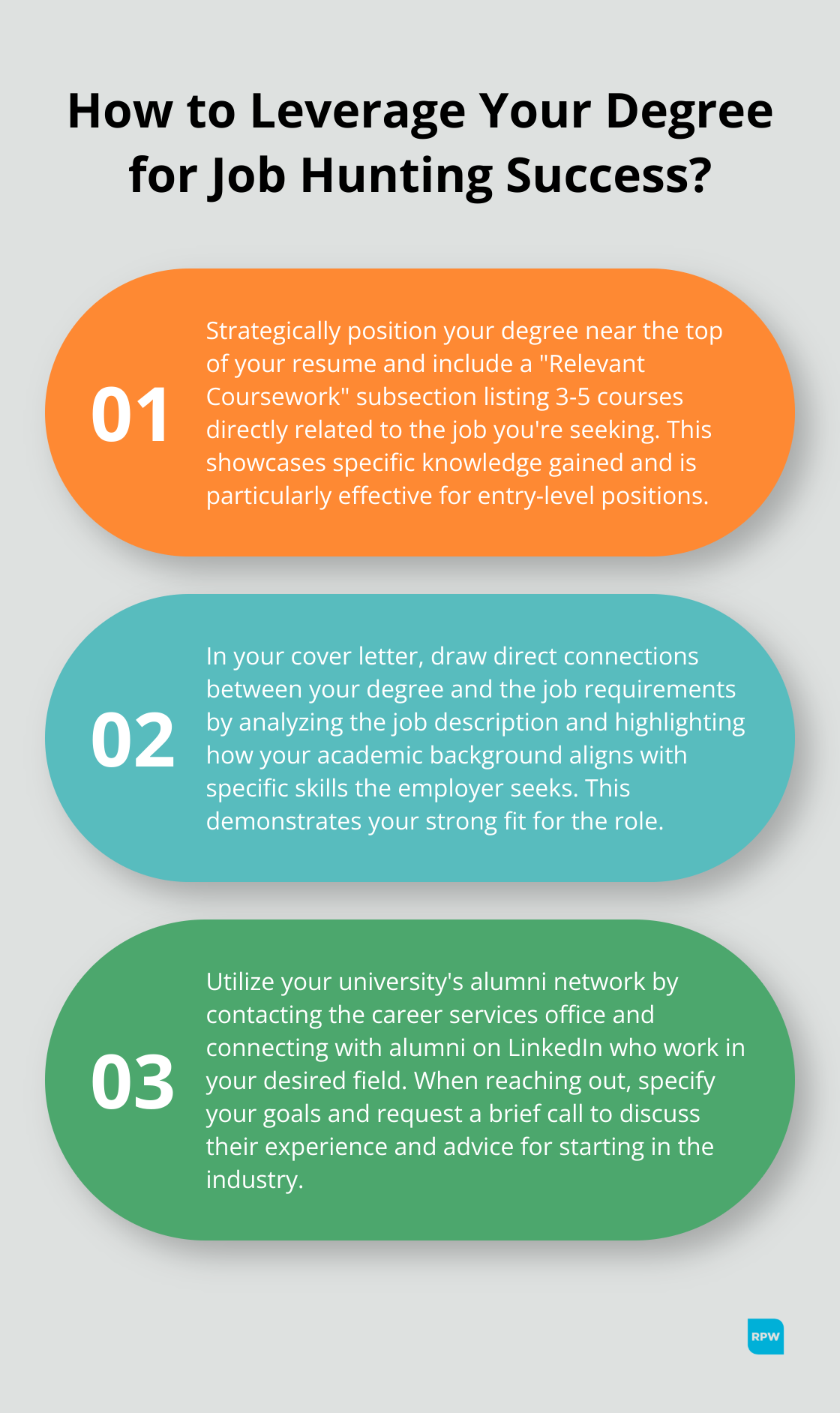Entering the job market as a recent graduate can be challenging. Your degree is a valuable asset, but knowing how to effectively use it in your job search by degree can make all the difference.
This guide will provide practical ways to leverage your academic achievements and skills throughout the job search process. From crafting a compelling resume to excelling in interviews, you’ll learn how to maximize your degree’s potential to land your dream job.

How to Showcase Your Degree in Your Job Search
Your resume often serves as the first impression you make on potential employers, and your degree represents a key asset that deserves prominent placement. We recommend strategically positioning your educational achievements to catch the eye of hiring managers and demonstrate your qualifications.
Optimal Placement of Your Degree
Place your degree in the education section near the top of your resume, especially if you’re a recent graduate or if your degree directly relates to the job you’re applying for. Include the full name of your degree, your major, the institution you attended, and your graduation date.
For example:
Bachelor of Science in Computer Science
University of California, Berkeley
Graduated: May 2023

Highlight Relevant Coursework
Don’t just list your degree; showcase the specific knowledge you’ve gained. Include a subsection titled “Relevant Coursework” where you list 3-5 courses that directly relate to the job you’re seeking. This approach proves particularly effective if you apply for entry-level positions or transition to a new field. For instance, if you’re applying for a marketing role, you might include courses like Digital Marketing Analytics, Consumer Behavior, and Brand Management.
Emphasize Projects and Research
Employers value practical experience, even if it’s academic. Create a “Projects” section where you detail significant assignments or research that demonstrate your skills. Be specific about your role, the technologies or methodologies you used, and the outcomes. For example:
Senior Thesis: Developed a machine learning algorithm to predict stock market trends with 85% accuracy using Python and TensorFlow.
Showcase Academic Achievements
Don’t be modest about your accomplishments. If you graduated with honors, maintained a high GPA, or received academic awards, highlight these achievements. According to a recent survey, 38.3% of employers plan to use GPA as a criterion in their college hiring process. If your GPA is 3.5 or above, include it on your resume. You can also list any academic honors or scholarships you received, such as:
- Dean’s List: 6 semesters
- Phi Beta Kappa Honor Society Member
- Presidential Scholarship Recipient
Tailor Your Resume to the Job
Try to customize your resume for each job application (this includes the education section). Read the job description carefully and identify key skills or knowledge areas the employer seeks. Then, adjust your coursework, projects, and achievements to align with these requirements. This tailored approach shows employers that you’ve done your homework and possess the specific qualifications they need.
Your degree represents a significant investment of time and effort. By strategically highlighting it on your resume, you show employers the value of your education and how it prepares you for the job. In the next section, we’ll explore how to leverage your degree effectively in cover letters and interviews, further strengthening your candidacy.
How to Leverage Your Degree in Your Job Search: Cover Letters and Interviews
Connect Your Academic Background to Job Requirements
Your degree represents a powerful asset in your job search. Analyze the job description carefully and identify key skills and qualifications the employer seeks. Draw direct connections to your degree in your cover letter. For example, a statistics graduate applying for a data analyst position might write:
“My Bachelor’s in Statistics from XYZ University has equipped me with advanced skills in data analysis and interpretation, aligning with your need for a candidate proficient in statistical modeling and data visualization.”

This approach immediately demonstrates to the employer how your education makes you a strong fit for the role.
Emphasize Relevant Skills Acquired Through Your Degree
Your degree has likely provided you with a range of valuable skills beyond subject-matter expertise. Highlight these transferable skills in both your cover letter and interview, and explain how they apply to the job at hand.
For instance, a history graduate applying for a research position could emphasize:
“My history degree honed my research and analytical skills. I spent countless hours examining primary sources and synthesizing complex information. These skills will allow me to excel in conducting market research and providing actionable insights for your company.”
Close to two-thirds of employers responding to the Job Outlook 2025 survey reported that they use skills-based hiring practices for new entry-level hires. Emphasize how your degree has developed in-demand competencies.
Share Examples of Applied Knowledge
Employers want to see that you can apply your academic knowledge in real-world situations. Share specific examples of projects, internships, or coursework where you’ve put your degree to practical use in your cover letter and during interviews.
A computer science graduate might say:
“For my senior project, I developed a mobile app that helps users track their carbon footprint. This experience solidified my programming skills in Java and Swift (languages crucial for your development team). It also taught me how to manage a project from conception to deployment.”
Providing tangible examples demonstrates that your degree has prepared you for the challenges of the job.
Discuss Academic Achievements
Don’t hesitate to highlight your qualifications. If you graduated with honors, maintained a high GPA, or received academic awards, mention these achievements. If your GPA is 3.5 or above, include it in your application materials.
You can also list any academic honors or scholarships you received, such as:
- Dean’s List: 6 semesters
- Phi Beta Kappa Honor Society Member
- Presidential Scholarship Recipient
These achievements demonstrate your dedication and academic excellence to potential employers.
Your degree sets you apart as a candidate. Effectively communicating its value in your cover letters and interviews shows employers that you’re not just qualified on paper, but ready to make meaningful contributions from day one. The next section will explore how to leverage networking and job search strategies specifically tailored for recent graduates.
Networking Strategies for New Graduates
Tap into Your Alumni Network
Your university’s alumni network offers a wealth of professional connections. Many alumni want to help fellow graduates from their alma mater. Start by contacting your university’s career services office. They often maintain databases of alumni willing to offer career advice or mentorship.
Research shows that 42% of students who did not have an internship during college reported low confidence levels in their networking skills. Your alumni network can serve as a powerful tool in this process. Connect with alumni working in your desired field or at companies that interest you. LinkedIn provides an excellent platform for this purpose. When reaching out, specify your goals and how they might assist. For example:
“Hi [Alumni Name], I recently graduated from [University] with a degree in [Your Major]. I noticed you work at [Company] in [Role], which aligns with my career interests. Would you be open to a 15-minute call to discuss your experience and any advice for someone starting in this field?”
Maximize Career Fairs and Industry Events
Career fairs and industry events provide unique opportunities to meet potential employers face-to-face. Research participating companies and prepare targeted questions before attending. This preparation demonstrates initiative and genuine interest.

Bring copies of your resume and prepare a concise elevator pitch about your background and career goals. Follow up with contacts you meet within 24-48 hours. A quick email thanking them for their time and reiterating your interest can keep you top of mind.
Build a Strong Online Presence
In today’s digital age, your online presence often creates the first impression on potential employers. LinkedIn is essential for professional networking, but don’t stop there. Depending on your field, platforms like GitHub (for developers), Behance (for designers), or Medium (for writers) can showcase your skills and thought leadership.
Update your profiles regularly with projects, certifications, and industry insights. Engage with content in your field by commenting on posts and sharing relevant articles. This activity increases your visibility and demonstrates your engagement with industry trends.
Offer Value in Your Interactions
Networking involves building relationships, not just asking for jobs. Try to offer value where you can, even if it’s just sharing an interesting article or congratulating someone on a recent achievement. These small interactions can lead to meaningful professional relationships over time.
Stay Persistent and Genuine
Persistence and authenticity are key in networking. Step out of your comfort zone and don’t fear rejection. Your degree has provided you with valuable knowledge and skills – now it’s time to put them to work in building your professional network.
Launching Your Career – Turning Your Degree into an Opportunity
Your degree equips you with valuable skills for your job search. You must showcase your academic achievements strategically on your resume and leverage your educational background in cover letters and interviews. The job market evolves rapidly, so you should stay current with industry trends and technologies to maintain a competitive edge.

A job search by degree requires confidence and an open mind. Remember, your first job is just the beginning of your career journey, not its ultimate destination. It’s important to apply your skills to new and exciting opportunities, even if they don’t perfectly align with your degree.
Translating academic achievements into professional success can be challenging, but having a well-crafted resume makes all the difference. If you’re looking for expert support in showcasing your degree and skills effectively, explore our professional resume writing services to help position yourself for exciting career opportunities and land your dream role.








